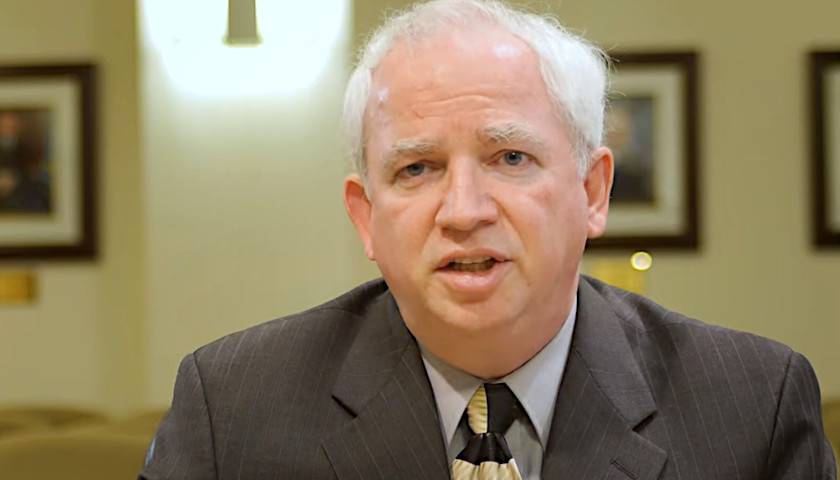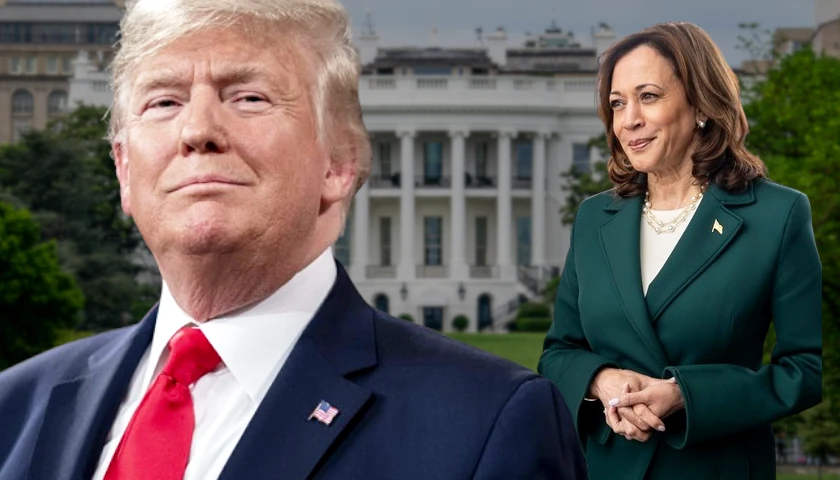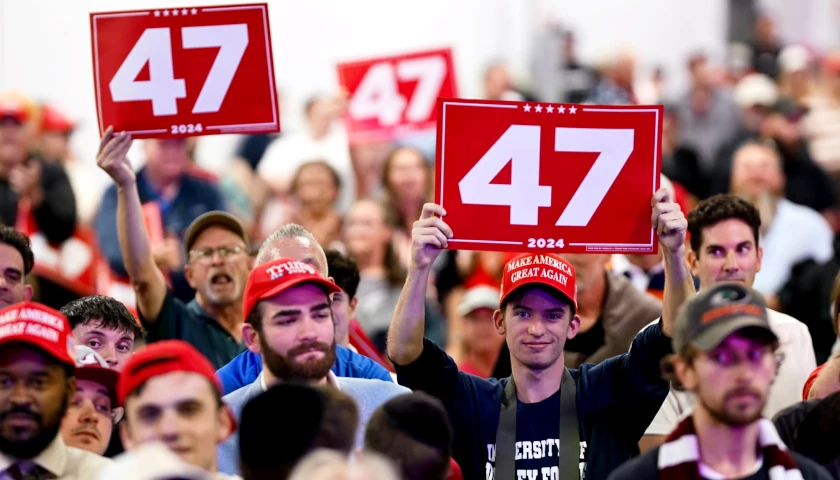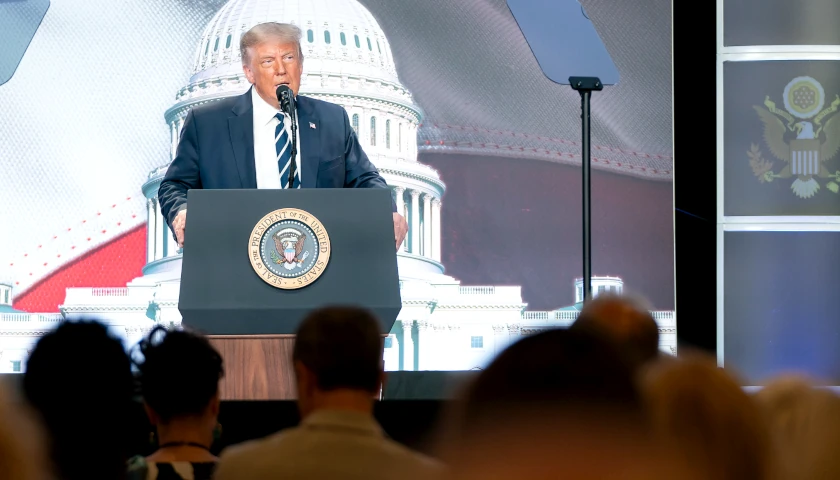LOS ANGELES, California – The State Bar of California (SBC) began a trial on Tuesday seeking to disbar conservative legal scholar John Eastman over his role advising former President Donald Trump and state legislatures on challenging the 2020 election results. The proceedings arose out of a complaint against him made by the States United Democracy Center (SUDC). SUDC is run by a former Obama appointee, Norm Eisen, and its advisory board includes former Arizona governor and Homeland Security Secretary Janet Napolitano.
The SBC charged Eastman with 11 ethics violations in January. Eastman filed a 100-page response containing thousands of attachments, and published a rebuttal on his Substack account. He said the SBC’s complaint “is filled with distortions, half truths, and outright falsehoods.”
Bar disciplinary Judge Yvette Roland began the proceedings handling various pretrial motions, followed by opening statements and the first witness, Eastman. Roland refused to allow several of Eastman’s witnesses to testify, including former appellate court judge Janice Rogers Brown. She refused to allow Joseph Fried, an auditor who wrote the book Debunked: An Auditor Reviews the 2020 Election — and the Lessons Learned, saying he had no expertise in the area. Jay Valentine, who built eBay’s fraud protection engine, was also rejected by Roland.
In his opening statement, SBC counsel Duncan Carling accused the Claremont Institute director of trying to stop the certification of the election, including by providing advice to Trump after the election stating that Vice President Mike Pence could reject electoral votes from states suspected of election fraud. Carling said the advice “was baseless, completely unsupported by historic precedent or law and contrary to our values as a nation.” While Eastman admitted he gave that advice, he also gave Trump other options he could take, such as accepting the votes.
Next, Randy Miller gave an opening statement for the defense. He said the issue comes down to “tenability,” “advocacy,” “protected speech,” and “the right to petition.” He asserted that it is a legal debate whether the vice president has the authority to reject the electoral votes.
Carling repeatedly tried to get Eastman to admit he believed there was election fraud in the 2020 election, bringing up his past statements, and Eastman did not deny nor backtrack from his statements. Eastman made statements like, “We had an unconstitutional election.”
In contrast, when Trump attorney Jenna Ellis was investigated by the State Bar of Colorado for statements she’d made about the election being stolen, she entered into an agreement with that bar where she admitted she had made “misrepresentations.”
Eastman testified that he was concerned officials may have been deliberately taking action to benefit the Biden campaign due to what he saw in Pennsylvania. He said Pennsylvania election officials illegally started an effort to cure ballots during the canvassing of mail-in ballots, and appeared to notify Democrats about it in advance since the Democrats started advertising for workers to do the curing before the curing plan was announced to the public and Republican election officials.
Carling showed the court a video clip of Eastman advising state legislators in states suspected of election fraud that they should decertify the election results, but it did not include the first part of his statement. Eastman told the court that it was taken out of context, since he had previously told the legislators they had various options. His attorney objected to admitting just that portion of the video, but Roland overruled him and allowed it in.
Judge Roland jumped in and rephrased Carling’s questions several times, making them more penetrating. Once when Carling appeared not to remember what question he’d asked, she repeated it for him. She admonished Eastman and Miller multiple times for minor issues, and did not admonish the SBC counsel for anything. She told Miller to stop interrupting her, and criticized Eastman for not answering the questions accurately.
One observer watching the trial tweeted, “A new attorney was added to the Bar team against John Eastman. Never mind, it’s just the judge!”
Carling frequently asked Eastman about previous remarks he’d made but did not describe them accurately. Eastman responded and corrected him, explaining that Carling was distorting his words. Carling’s distortions made Eastman’s advice look more radical. The judge did not call Carling out for the exaggerations.
Roland lectured him when he claimed attorney-client privilege, declining to answer one of Carling’s questions asking who one of his clients was. She said Eastman could reveal who a client is, since merely naming the client doesn’t violate attorney-client privilege. Eastman retorted that if he revealed which clients he told could choose other electors, that would reveal privileged communication he gave a client. Roland responded and said she would resume assessing the issue on Wednesday.
Carling questioned Eastman extensively regarding Eastman’s concern that loosening signature verification standards resulted in many more early ballots being accepted. Carling implied that his concern was invalid. He also asked him if he agreed with Georgia Secretary of State Brad Raffensperger that only 74 felons voted in the 2020 election. Eastman instead stuck by his previous statements that as many as 2,500 felons may have voted in the state’s 2020 election, citing the work of election investigator Bryan Geels. Carling tried to characterize Eastman’s previous remarks as indicating he was sure there were 2,500, but Eastman called him out on it and clarified that he’s said “as many as” as well as the fact he had not had a chance himself to thoroughly look into it.
Carling focused heavily on the fact that Eastman cited the work of election investigator Bryan Geels, who initially said that around 66,000 underage people registered to vote in Georgia, but later admitted he made a mistake in calculating it and corrected it to just over 2,000 underage voters. Eastman shot back that Raffensperger mischaracterized the description in the media by claiming that Geelos was referring to underage people who had voted, instead of merely registered to vote.
A lawyer who preferred not to be identified due to fear of retaliation told The Arizona Sun Times that he believes the reason the SBC is going after Eastman so hard is because it has been under criticism for ignoring misbehavior by well-connected attorneys. He said one of them had received over 200 bar complaints but no action was taken against him.
The trial is scheduled to run for two weeks, but it could end earlier. It is being live streamed. If Eastman loses, he can appeal all the way up to the U.S. Supreme Court. He is a former law clerk for Justice Clarence Thomas. He has a legal defense fund seeking $500,000 which is at $385,048.
– – –
Rachel Alexander is a reporter at The Arizona Sun Times and The Star News Network. Follow Rachel on Twitter. Email tips to [email protected].
Image “John Eastman” by iSCOTUS.




